[CSH Workshop] Caste Hi (stories) and Popular Engagement with the Past: Politics of the Marginalized Caste Groups (S. Kumar)
The Centre de Sciences Humaines is pleased to invite you to the CSH Seminar
by
Satendra Kumar
(Institute of Asian and Oriental Studies, University of Zurich)
on
Caste Hi (stories) and Popular Engagement with the Past:
Politics of the Marginalized Caste Groups

Followed by discussion with Prof. Surinder Singh Jodhka (JNU)
Monday, 29 January 2024, from 5:00 pm to 6:30 pm IST
To register: Please fill the Registration form
Abstract:
In contemporary India, communities and individuals continue to interpret the past in a variety of ways for multiple purposes that have real political consequences. While at the national level, the Hindu nationalist organisations have created and deployed narratives of the past to give credence to the idea of the Indian nation as eternally Hindu, at the regional level, erstwhile nomads and peasant caste communities have also been writing their own narratives of the past by drawing on myths, oral epics, memories, and colonial documents. Most of these narratives, recorded and written not in English but rather in the vernacular languages of India, did not need to seek the approval of academic history and its institutions since ‘they seek their legitimacy in the domain of the popular,’ and have the specific purpose of expressing historical grievances while calling group members to political action, though, in part, memorialising selective events from the past while eliding others. This presentation explores such relationships between the self-fashioning of caste, identity formation and democratic politics in Uttar Pradesh (UP), North India. By focusing on Gujjars, an erstwhile nomad-peasant caste community, which had been stigmatised as ‘criminal’ by the colonial rule, (re)construct narratives of the past while repositioning the self, I argue that Gujjar cultural realities, which are produced in specific sociohistorical contexts, the post-Mandal, Mandir politics and neo-economic reforms of the 1990s, have serious implications not only for Indian democracy but also for History as an academic discipline and, most importantly, for the European knowledge project.
 Satendra Kumar is a Social Anthropologist and Senior Researcher at the Institute of Asian and Oriental Studies, University of Zurich, Switzerland. He is also a Senior Visiting Fellow at the Institute for Human Development, Delhi. He works across the fields of sociology and anthropology of caste, class, agrarian political economy, and political anthropology. His research investigates how marginalized groups understand and engage with democratic politics and the state in contemporary India. He has conducted long-term ethnographic fieldwork on these issues in Uttar Pradesh and Punjab. Recently, he has been working on Dalit assertion and Jat farmers’ politics in Sangrur, Punjab. He has written widely on rural-agrarian transformation in north India. He has been awarded the British Academy Fellowship at the London School of Economics and Political Sciences, UK. He has also been a Visiting Fellow at the Johns Hopkins University, the Centre for the Study of Developing Societies (CSDS), Delhi, Bielefeld University, Germany, University of California, Berkeley, and Indian Institute of Advanced Study (IIAS). He is currently Coeditor, Book Reviews Section at the Journal of Peasant Studies.
Satendra Kumar is a Social Anthropologist and Senior Researcher at the Institute of Asian and Oriental Studies, University of Zurich, Switzerland. He is also a Senior Visiting Fellow at the Institute for Human Development, Delhi. He works across the fields of sociology and anthropology of caste, class, agrarian political economy, and political anthropology. His research investigates how marginalized groups understand and engage with democratic politics and the state in contemporary India. He has conducted long-term ethnographic fieldwork on these issues in Uttar Pradesh and Punjab. Recently, he has been working on Dalit assertion and Jat farmers’ politics in Sangrur, Punjab. He has written widely on rural-agrarian transformation in north India. He has been awarded the British Academy Fellowship at the London School of Economics and Political Sciences, UK. He has also been a Visiting Fellow at the Johns Hopkins University, the Centre for the Study of Developing Societies (CSDS), Delhi, Bielefeld University, Germany, University of California, Berkeley, and Indian Institute of Advanced Study (IIAS). He is currently Coeditor, Book Reviews Section at the Journal of Peasant Studies.
For more info contact:
CSH Seminars are in hybrid mode. We request you to pre-register before Monday, 29 January, 2:00 p.m. IST for both offline and online registration.
To attend at venue: Please note that the room capacity is limited. Seats will be reserved on a first come first basis. Kindly carry an ID proof to be granted access to the venue.







